|
|
|
Sort Order |
|
|
|
Items / Page
|
|
|
|
|
|
|
| Srl | Item |
| 1 |
ID:
107221
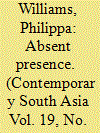

|
|
|
|
|
| Publication |
2011.
|
| Summary/Abstract |
This paper examines the everyday experiences and perspectives of Muslim Ansa-ris (weavers) in urban north India with respect to the 'welfare state'. The case of a recent health insurance scheme, initiated by the Indian government, constitutes the paper's focus. Narratives around the scheme expressed by residents in a majority Muslim mohalla- (neighbourhood) in Varanasi illustrate the ways in which the state's presence was more often experienced through its perceived absence and inaccessibility. But even whilst such experiences represented broader patterns of neglect, locally interpreted as the upshot of being India's largest religious minority, this community was not stricken by a sense of absolute alienation and nor did individual or collective actions exhibit outright disaffection towards the state. More appropriately, 'defensive agencies' informed by degrees of pragmatism, acceptance and resilience, were articulated in an effort to protect, as well as improve the future capacities and ambitions of the neighbourhood residents where the state had seemingly failed. The paper concludes however with a word of caution about celebrating such agency, and reflects on the potential for transformative politics by Muslims in urban India.
|
|
|
|
|
|
|
|
|
|
|
|
|
|
|
|
| 2 |
ID:
129529


|
|
|
|
|
| Publication |
2014.
|
| Summary/Abstract |
The urban clearance programmes that were pursued on a vast scale during the Emergency are frequently alluded to by historians but remain poorly understood. In particular, historians have reproduced the assumptions and limited scope of the Shah Commission of Inquiry, which published its reports on the Emergency in 1978. Histories of the Emergency's urban policies have, therefore, focused overwhelmingly on Delhi and north India, on the demolition of buildings, and on the role of Prime Minister Indira Gandhi's son, Sanjay Gandhi, as instigator of these policies. This article uses case studies to demonstrate that these policies were not limited to Delhi and its environs, and to show that a concentration on the demolition of buildings has led historians to neglect the clearing of unwanted people from India's cities. The article goes on to reassess the thinking that underpinned these policies through a case study of Jagmohan, the head of the Delhi Development Authority during the Emergency. It shows how his ideas on urban aesthetics and civics informed the urban clearance programmes and how these authoritarian republican ideas suggest a way of rethinking the history of the Emergency as a whole.
|
|
|
|
|
|
|
|
|
|
|
|
|
|
|
|
| 3 |
ID:
119580
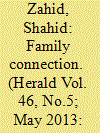

|
|
|
| 4 |
ID:
137715


|
|
|
|
|
| Summary/Abstract |
Recent scholarship on urban energy governance has focused on low carbon energy strategies seen as a response to climate change and energy pressure threats. But such approaches tend to overlook the situations of cities from the Global South and emerging countries concerned with strong energy demand growth. The development of urban natural gas networks is an understudied response to such a challenge. Focusing on three cities, Istanbul, Cairo and Sfax (Tunisia), the article analyses the factors and the governance of these energy transitions. It uses a geographical approach to such processes that highlight the mutual influence of the territory in its material and political dimensions and of the policy goals and tools in the implementation. The development of urban gas networks rests upon the proximity of gas deposits. It is determined by metropolitan strategies for economic development as well as by programs aiming to cut energy subsidies. Though urban gas networks have a strong potential for restructuring the physical and social landscapes in cities, the dominant commercial approach taken by energy utilities and morphological constraints in the urban fabric limit their universalization. Natural gas is part of a mix of energies at the urban level and often competes with other energy forms, specifically renewables (like solar water heaters). Lastly, the development of urban natural gas networks sparks heated politics in relation to unfulfilled energy demand and affordability.
|
|
|
|
|
|
|
|
|
|
|
|
|
|
|
|
| 5 |
ID:
095882
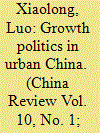

|
|
|
|
|
| Publication |
2010.
|
| Summary/Abstract |
This paper examines territorial politics in China, using the case of Jiangsu's Jiangyin-Jingjiang Industrial park (JJJIP), jointly owned by the cities of jiangyin and Jingjiang.
|
|
|
|
|
|
|
|
|
|
|
|
|
|
|
|
| 6 |
ID:
139626
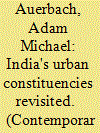

|
|
|
|
|
| Summary/Abstract |
This article examines patterns of voter turnout and electoral competition in India's urban parliamentary constituencies. It places the 2014 Lok Sabha elections in historical context, drawing on constituency-level data from national elections since 1977 to explore broad changes and continuities in electoral competition, party structures, and voter turnout, with particular focus on comparisons between urban and rural India. The purpose of the article is descriptive, seeking to fill a gap in the literature on electoral competition in urban India. I find evidence that India's urban constituencies have recently, on average, been less competitive and participatory than non-urban constituencies, though this has not been a consistent trend since the mid-1970s. This article concludes with a brief outline for a research agenda on electoral politics in urban India.
|
|
|
|
|
|
|
|
|
|
|
|
|
|
|
|
| 7 |
ID:
121211


|
|
|
|
|
| Publication |
2013.
|
| Summary/Abstract |
In the last few years, the demands of homeowners in Chinese cities have gradually shifted away from economic rights and towards political ones. At the same time, alliances across different communities have emerged and vigorous attempts to form citywide solidarities have been made. In this process, a group of dedicated leaders has emerged, contributing greatly to the escalation of collective actions. This article focuses on a core group of Beijing activists behind the organization, expression and participation of homeowners' associations. Relying on data collected from interviews, documents and participatory observations conducted over a period of more than two years, we were able to pin down the socio-economic, social and political backgrounds of these leaders, as well as their attitudes, objectives and repertoire of actions. We describe leaders as falling into a two-by-two typology that is defined by a motivation dimension and an activeness dimension. Depending on his or her goals and approaches, a protest leader can be variously viewed as a political actionist, a frustrated changer, a double harvester or a tiger rider. These different types of leaders are all in one way or another promoting socio-political changes in China.
|
|
|
|
|
|
|
|
|
|
|
|
|
|
|
|
| 8 |
ID:
124508
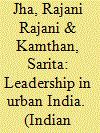

|
|
|
|
|
| Publication |
2012.
|
| Summary/Abstract |
The role of urban political leadership, crucial thought, it has lately underwent a tremendous expansion and change in the wake of globalization and adoption of neo-liberal economic policies, by the Government of India, the 74th Amendment act 1992 and the introduction of Jawaharlal Nehru Urban Renewal Mission -JNNURM 2005-2006, etc. The leader in the changing city scenario is meeting newer challenges every other day. Whether the competence and character of the emerging leadership matches or not with this expanding role requirement of the urban political leader becomes a vital issue which needs to be addressed urgently. The present article make a modest attempt in this direction on the basis of a study of the emerging political leadership in the city of Allahabad.
|
|
|
|
|
|
|
|
|
|
|
|
|
|
|
|
| 9 |
ID:
093654


|
|
|
|
|
| Publication |
London, Zed Books, 2009.
|
| Description |
viii, 200p.
|
| Standard Number |
9781848132962
|
|
|
|
|
|
|
|
|
|
|
|
Copies: C:1/I:0,R:0,Q:0
Circulation
| Accession# | Call# | Current Location | Status | Policy | Location |
| 054693 | 320.85/KOO 054693 | Main | On Shelf | General | |
|
|
|
|
| 10 |
ID:
090394
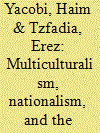

|
|
|
|
|
| Publication |
2009.
|
| Summary/Abstract |
One of the central issues in the study of urban politics today is the fact that many cities have become multicultural arenas. The liberal viewpoint stresses the potential of the city-unlike other spaces-to offer many and equal opportunities for all residents regardless of religion, gender, or ethnic affiliation, but the critical body of knowledge highlights the ways in which the city, although apparently released from the shackles of nation- and state-building projects, continues to reproduce existing power structures and is a stratifying place, maintaining patterns of discrimination, exclusion, and segregation. This tension between the city as an enabling space versus the city as a reinforcer of socionational stratification is at the center of this article.
|
|
|
|
|
|
|
|
|
|
|
|
|
|
|
|
| 11 |
ID:
161548
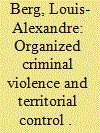

|
|
|
|
|
| Summary/Abstract |
What accounts for geographic variation in organized criminal violence? In Honduras, a country with one of the highest homicide rates in the world, the intensity of violence rivals many civil wars. Yet violent crime varies across cities and neighborhoods. Armed groups seeking to control territory use violence for different purposes, including competing against rivals, coercing residents and state officials, and exploiting the public for profit. Variations in community organization, defined as the density of interpersonal ties and the prevalence of shared expectations for collective action, affect the utility of violence for each of these purposes. Community organization can raise the cost of controlling territory, reduce the benefits of coercive violence, and generate pressure to protect residents from exploitation. These dynamics are examined through a comparison of nine neighborhoods in three of Honduras’s most violent cities, drawing from disaggregated homicide data and ethnographic research. The comparison shows that neighborhoods with denser community organization experienced lower levels of violence. Narrative evidence points to specific ways in which community organization mediates effects of competition among criminal groups and their interaction with state officials. Community characteristics thus affect the way non-state armed actors exercise authority in areas of limited state presence.
|
|
|
|
|
|
|
|
|
|
|
|
|
|
|
|
| 12 |
ID:
114930
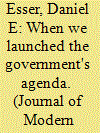

|
|
|
|
|
| Publication |
2012.
|
| Summary/Abstract |
Political realities in the capital cities of impoverished countries emerging from violent conflict illustrate how local actors can be hindered in conducting political affairs independently from the interests and influence of national governments as well as international agencies. This experience problematises the argument that the main cause of political impasse in African cities governed by opposition parties is incomplete decentralisation, whereby a devolution of responsibilities is not matched by a downward reallocation of resources. Although resulting competition constrains local governments' opportunities to deliver basic services, we need to look beyond the national scale to uncover the drivers of institutional change and gauge the promise of donor-driven local political empowerment. Urban politics in Africa continues to be shaped by global aid discourses, which are translated into local policy frameworks through interest convergence between international and national actors. The case of Freetown, Sierra Leone provides an illustration of such macro-level alignment and resulting local frictions. At the same time, it also demonstrates how local politics have challenged the technocratic, apolitical reinvention of urban governance in the global South perpetuated by the international aid industry.
|
|
|
|
|
|
|
|
|
|
|
|
|
|
|
|
|
|
|
|
|